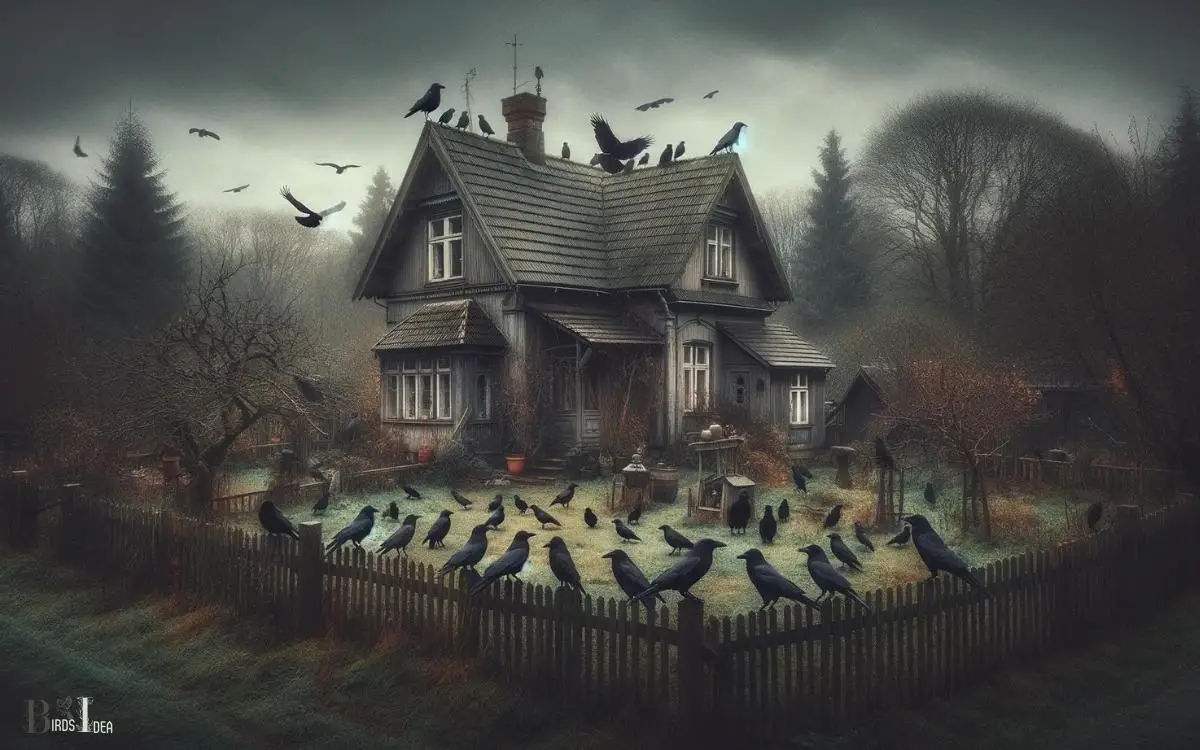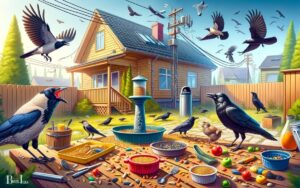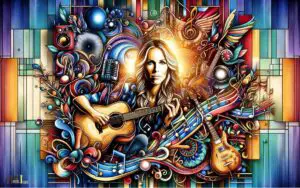What Does It Mean When Crows Gather around Your House?
When crows gather around your house, it often signifies their search for food, safety, or social interaction.
These intelligent birds may also be responding to environmental factors or participating in communal behaviors such as roosting or mobbing predators.
Crows are highly social and intelligent birds, and their presence near your home can be attributed to several reasons:
The presence of crows around your home is a natural behavior driven by their survival instincts and social dynamics, rather than supernatural causes.
Understanding the motives behind crows’ gatherings can provide reassurance and fascination to those observing these intelligent creatures.

Key Takeaway
Cultural and Mythological Significance:
Western Cultures:
- Death and Transformation: In Western cultures, crows are often associated with death and transformation. The gathering of crows around a house might be interpreted as a symbol of impending change or a significant transformation in the lives of the occupants.
- Messenger of the Divine: In some cultures, crows are seen as messengers of the divine or as symbols of intelligence and mystery. The gathering could be interpreted as a message from the spiritual realm.
Native American Traditions:
- Communication with the Spirit World: Many Native American tribes view crows as mediators between the physical and spiritual realms. The presence of crows around a house may signify a connection with the spirit world or a need for spiritual awareness.
- Guardianship: Some Native American tribes consider crows as guardians of sacred law. Their gathering might symbolize protection or a reminder to adhere to certain moral or ethical principles.
Japanese Culture:
- Bringers of Good News: In Japanese folklore, crows are believed to bring good news. A gathering of crows around a house could be seen as a positive omen or an indication of upcoming positive events.
- Connection to the Sun Goddess: In Shinto mythology, crows are associated with the sun goddess Amaterasu. The presence of crows might be interpreted as a sign of divine favor or protection.
Symbolism in Folklore and Mythology
The symbolism of crows gathering around a house is rich and diverse in folklore and mythology.
Across different cultures, crows often carry multifaceted meanings, and their presence can be interpreted in various ways.
Here are some common symbolic interpretations found in folklore and mythology:
Greek Mythology
In Greek mythology, crows are associated with Apollo, the god of prophecy. The belief is that crows were his messengers, carrying important information between the mortal and divine realms. The presence of crows could be seen as a message from the gods.
Celtic Folklore
In Celtic traditions, crows were often linked to death and transformation. Their gathering around a house might be interpreted as a symbol of impending change or a transition in one’s life, possibly associated with the spirit world.
Norse Mythology
In Norse mythology, crows were associated with Odin, the Allfather. Two ravens, Huginn (thought) and Muninn (memory), were said to fly around the world and bring information to Odin.
The gathering of crows might symbolize divine protection or the watchful eyes of spiritual guardians.
Egyptian Mythology
In ancient Egypt, crows were linked to the goddess Morrigan, who was associated with death and fate.
The gathering of crows might be seen as guides or messengers leading the souls of the departed to the afterlife.
Chinese Folklore
In Chinese folklore, crows are often considered symbols of good luck and protection. Their gathering around a house might be seen as a positive omen, indicating good fortune and the blessing of celestial beings.
Native American Traditions
Many Native American tribes view crows as spiritually significant animals. The gathering of crows might symbolize a connection to the spirit world, with the birds acting as messengers or intermediaries between the physical and metaphysical realms.
Hindu Mythology
In Hindu mythology, the crow is sometimes associated with Shani, the god of karma and justice.
The gathering of crows might be seen as a symbol of wisdom and the importance of righteous living.
Literary Symbolism
Beyond folklore and mythology, crows are often used symbolically in literature. They may represent mystery, intelligence, or the unpredictable nature of fate. Authors draw on these cultural associations to convey deeper meanings in their works.
It’s crucial to note that interpretations can vary widely depending on the specific cultural context and beliefs.
The symbolic meaning of crows gathering around a house might be influenced by local folklore, regional traditions, and individual perspectives on the natural world.
Spiritual and Supernatural Beliefs
A common belief among spiritual and supernatural practitioners is that the gathering of crows around a house may signify a message from the spiritual realm.
In various spiritual and supernatural belief systems, crows are often seen as symbols of transformation, change, and the mysteries of life.
Some practitioners interpret the presence of crows as a sign of impending spiritual growth or a warning of unseen danger.
In certain cultures, crows are also associated with the presence of ancestors or departed loved ones, leading to the belief that their gathering around a house may indicate a visitation from the spirit world.
While interpretations vary widely, many spiritual and supernatural believers view the presence of crows as a powerful and symbolic communication from the spiritual realm, prompting individuals to pay attention to their surroundings and inner thoughts.
Environmental and Ecological Factors
When crows gather around a house, their behavior can be influenced by a variety of environmental and ecological factors.
Crows are highly adaptable and intelligent birds, and their presence can be indicative of certain conditions or situations.
Here are some environmental and ecological factors that may contribute to crows gathering around a house:
Food Sources:
Crows are opportunistic feeders and are attracted to areas with abundant food sources. If there are readily available food items, such as garbage, compost, pet food, or insects, crows may gather in the vicinity of a house.
Roosting Opportunities
Crows are known to roost in large groups, especially during the night. If there are suitable roosting sites nearby, such as tall trees or structures, crows may gather in the area before settling down for the night.
Access to Water
Like many other bird species, crows require water for drinking and bathing. If a house is near a water source, such as a pond, river, or birdbath, crows may gather to fulfill their hydration and hygiene needs.
Social Interactions
Crows are social birds that often engage in communal activities. Gathering around a house may be part of their social behavior, involving communication, bonding, and coordination of activities like foraging.
Shelter from Adverse Weather
Crows may seek shelter around houses during inclement weather conditions, such as heavy rain, strong winds, or extreme temperatures. The house and its surroundings may offer protection from harsh environmental elements.
Nesting Sites
Crows may gather in areas conducive to nesting and breeding. If a house provides suitable nesting sites or if there are nearby locations with appropriate nesting conditions, crows may congregate for breeding purposes.
Urban Environments
Crows have adapted well to urban environments, where they can find food, shelter, and nesting sites.
The presence of human habitation and modified landscapes can attract crows to residential areas.
Safety from Predators
Crows are known to be wary of predators, and gathering in larger groups can provide protection.
If there are potential threats in the area, such as larger birds of prey or other predators, crows may form larger groups for safety.
Seasonal Movements
In some regions, crows may exhibit seasonal movements, such as migration or changes in foraging patterns.
The gathering around a house could be part of their natural movements in response to environmental changes.
It’s important to consider a combination of these factors when observing crows gathering around a house, as their behavior is likely influenced by a complex interplay of environmental and ecological elements.
Understanding these factors can provide insights into the reasons behind crow gatherings in specific locations.
Practical Tips for Coexistence
Observing the crows’ behavior and adapting your environment can promote peaceful coexistence with these intelligent birds.
To discourage crow activity around your house, secure your garbage in bins with tight-fitting lids and avoid leaving pet food outside.
Additionally, prune trees to reduce roosting and nesting sites, and use scare tactics such as shiny objects, noise deterrents, or water sprays to discourage crow gatherings.
Installing bird feeders with large perches can deter crows while still attracting smaller bird species.
If you find crows nesting on your property, it’s important to check local regulations before taking any action, as crows are protected under the Migratory Bird Treaty Act.
Conclusion
The presence of crows gathering around a house has been historically and culturally significant, with symbolism in folklore and mythology, as well as spiritual and supernatural beliefs.
Crows are often seen as messengers and omens, and their relationship to death and the afterlife is widely recognized.
Environmental and ecological factors also play a role in their presence. Remember, ‘One man’s food is another man’s poison,’ and it is important to find practical ways to coexist with these intelligent and complex creatures.






